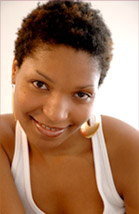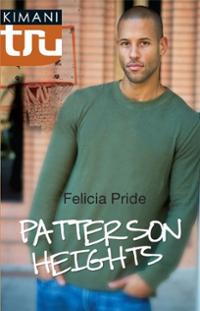Last week, author and communications entrepreneur Felicia Pride visited five different sections of instructor Samantha Vacknin’s class at Northwestern High School in Baltimore. Pride, who grew up in Baltimore after spending her early years in New Jersey, knows a thing or two about the city, and her 2009 novel Patterson Heights is a head-on look at an incident of violence and its aftershocks that ripple through the community. As so many of them do, this Writers in Schools visit represented a rare opportunity for readers of Pride’s work to meet the author and to ask her questions about her life, her work, her time in college and graduate school, and her use of the vernacular in the novel. Below are just a few of the many questions posed to pride during her visits to Northwestern, followed by Pride’s answers.

Q: How did you become a writer?
Felicia Pride: Well, after high school—I went to Milford Mount—I went to Towson. I decided to study business. I liked to write, but I didn’t know how I was going to a make a living by writing full-time, so I ended up working in corporate America. That was really, really hard, and I found myself writing during the day. […] Later, I got an internship at a community paper in New York, and I was writing about music. I found that I loved writing about music. That first review was of a Mary J. record, and I remember seeing my name in print […] That was an incredible feeling, and it made me want to continue writing, so I eventually went to graduate school in Boston so that I could study writing.
Q: What keeps you writing?
Felicia Pride: For me, writing is just one of those things I can’t help but do. For some people, there’s sports or making music, and for me, that creative outlet has always been writing.
Q: How do you avoid writers’ block when you’re working on a story or a novel?
Felicia Pride: Fiction’s tough for me this way. There’s just so much that you have to include and to know in order for the story to make sense. In nonfiction and journalism, I feel like I have more control and can be more succinct. There’s not so much to invent. Really, the drafting process is hard, too. The truth of it is that the first things I generally write are terrible, and I have to go back over that draft and work to craft it and shape it in order to make it work.
When I teach, I have to tell my students not to worry about getting stuck. I do a lot of free-writing exercises with them to help get them used to the idea that not everything has to come out perfectly and that, in reality, it almost never does.
Q: Were you confident when you decided you were going to write this book?
Felicia Pride: No, actually! Not at all. Writing this novel was an entirely new experience for me. I started really writing in 2001, mostly because I didn’t like my job and wanted to find something else to do with my time. I wasn’t confident about my writing then, and sometimes I’m not confident about it now, but I think that’s true for a lot of writers.

Q: Why did you title the book Patterson Heights?
Felicia Pride: Well, you might be able to guess this, but it’s a combination of Park Heights and Patterson Park. My editor asked me if the name was a real neighborhood, and I told her what I’ll tell you: it’s sort of a combination of names and places. [I did it that way] because I wanted it to be recognizable as Baltimore, but I didn’t want to limit myself to one particular neighborhood, so I used my own, fictional neighborhood in the book.
Q: When you were writing the book, did you ever think that it would have an impact on the younger people who read it?
Felicia Pride: No, actually. Writing a book is hard work, so I was just trying to get through the process of that and tell the story of this family. That was hard enough, so I didn’t really imagine how it would affect readers.
Q: So, when you’re writing a book like this, one that features young people, do you think that that’s how we [younger people] actually talk and act?
Felicia Pride: Actually, not exactly. I’m invested in hip-hop culture as a fan and as a writer, and when I’m writing, I try to utilize the things I think and feel and see in hip-hop and to use hip-hop methods—like remixing and sampling—in my own work. So, I guess I’m just as interested in seeing how to incorporate some of those things as I am in depicting thoughts or speech that perfectly mirrors how young people in 2013 speak.
Q: Why do you use the word “cats” to describe people in the book?
A: I just love that word, I think! It’s sort of old school, and I’d like to bring that one back. It’s a great word.
Q: Do you have a favorite author?
Felicia Pride: Oh, I have a lot of favorite authors. One of them that I keep mentioning to classes here is a writer named Percival Everett. He’s immensely talented. He wrote an entire novel [American Desert] about a man who has been decapitated. To write that such skill and imagination is really tough. I mean, the main character has no head, but because Percival Everett is such a talented writer, you just sort of go with it.
Q: Why did you set the book in Baltimore?
Felicia Pride: Well, I think it’s a really unique city. We get a lot of shine but not a lot of respect. Even with the Ravens—I mean, we won the championship, but that team and this town still get criticized for so much!
Q: How does it feel to have a job that you love?
Felicia Pride: It feels like freedom. Really. Doing things that make you happy feels like freedom, but having to monetize the things you love can have the opposite effect. […] So, in my case, I think it’s all about finding balance so that you can support yourself without feeling too trapped.
Q: Are you working on another book now?
Felicia Pride: […] I’m working on a project about my family, but I don’t think it’s a book exactly. I think it’s a story that will have to be told through a variety of media. I imagine it including pictures and music, things that will give the story of my family members and of ’60s and ’70s Baltimore more texture […] I think every story has to be told in the right way, and so I’m working on that multimedia project now.
Q: What are some of your goals for the future?
Felicia Pride: Good question. I think that, as you live, you have to keep setting new goals for yourself. I think it’s important to celebrate accomplishing your goals, but it’s important not to sit back for too long. You’ve got to keep moving forward.
